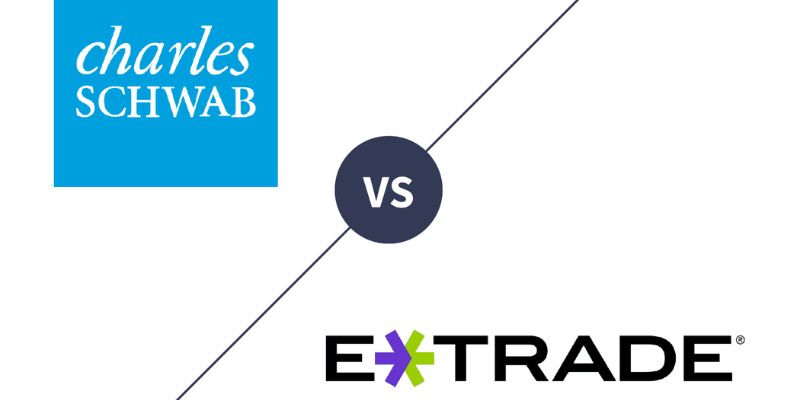Charles Schwab vs. E*TRADE
Jul 30, 2023 By Rick Novak
With over $3 trillion in client assets and 15 million accounts worldwide, it is arguably one of the largest conglomerates of its kind. In comparison, E*TRADE is widely known for its 24/7 online trading capabilities presenting customers with an easy-to-use platform to access markets worldwide effortlessly.
Though there are many similarities between these two financial giants, there are some clear differences regarding fees & commissions, research tools & platforms, and mobile application accessibility.
Let's look at how Charles Schwab compares against E*TRADE under different criteria to better understand which service would best suit your needs!
Charles Schwab vs. E*TRADE: Which One Is Better

Usability
Regarding usability, Charles Schwab and E*TRADE have done a great job making their interfaces user-friendly. Both brokerages offer free interactive charting tools, newsfeeds, and real-time market data.
Charles Schwab has a more robust platform with customizable features such as multiple watch lists, streaming quotes & charts, and advanced order entry capabilities; while E*TRADE provides basic trading options without any extra bells & whistles. It boils down to personal preference when deciding which platform best suits your needs.
Trade Experience
The trade experience offered by Charles Schwab and E*TRADE are both user-friendly but vary in certain aspects.
Charles Schwab stands out for its award-winning trading platform available on web and mobile applications. It provides investors with extensive tools, like third-party research, analytics, and commentary, to support their investments.
On the other hand, E*TRADE offers various features to enhance the customer's trading experience, such as 24/7 access to markets worldwide. It also has powerful advanced charting capabilities that can help identify trends or areas of opportunity for potential investment.
Ultimately, investors need to take time to explore the different offerings of each company to determine which one is best for their individual needs.
Range of Offerings
Charles Schwab and E*TRADE offer customers various products to invest in. At Charles Schwab, individual investors can access stocks, bonds, mutual funds, ETFs, and options. On the other hand, E*TRADE provides its users with an extensive range of investments, including stocks, ETFs, options trading, mutual funds, and fixed-income securities.
Furthermore, both firms provide retirement planning services such as Roth and Traditional IRAs and custodial accounts for minors. Whether you're looking for short-term investment opportunities or long-term diversification strategies – choosing between Charles Schwab and E*TRADE allows investors to find the perfect fit for their needs.
Order Types
Charles Schwab and E*TRADE offer several different order types for traders. Charles Schwab offers various limit, stop-loss, and stop-limit orders. E*TRADE also provides many different order types, including market, trailing stops, and alarms.
Both firms support day orders and conditional orders such as "one cancels another" or "fill or kill." For more advanced traders, both brokerages offer portfolio margin accounts which allow customers to leverage their positions in certain stocks.
Each brokerage also supports complex options strategies like straddles, spreads, and collars. These two leading brokerages are committed to providing the best in order types to meet the needs of any investor.
Trading Technology

Charles Schwab and E*TRADE are both leaders in trading technology. Charles Schwab offers the StreetSmart Edge platform, an advanced suite of tools for active and experienced traders. It features cutting-edge charting capabilities, powerful analytics, and easy access to global markets.
Meanwhile, E*TRADE has its powerhouse platform, Power E*Trade, which provides a user-friendly environment with sophisticated streaming charts and market data analysis tools.
Both platforms allow customers to customize their interface to meet their trading needs. With so many options available, investors can find the perfect online resource to help them stay informed about the markets and make informed decisions when investing.
Costs
Charles Schwab and E*TRADE have a wide range of services, but there are some key cost differences to consider when choosing between the two.
Charles Schwab is often more expensive for trading stocks and bonds at $4.95 per trade, while E*TRADE only charges $0 for online stock trades. Additionally, Charles Schwab requires customers to maintain a minimum balance of $1000 to avoid paying an account maintenance fee, whereas E*TRADE does not impose such restrictions.
Regarding mutual funds and ETFs, Charles Schwab's fees are lower than those of E*TRADE, with no commission charge on most funds. Ultimately, customers should evaluate their needs when deciding which platform is right for them and their pocketbooks.
Account and Research Amenities
When it comes to account and research amenities, Charles Schwab and E*TRADE offer a variety of competitive options. Customers of both firms will find they have access to comprehensive trading platforms with extensive research capabilities.
Both companies provide their customers with all the necessary information to make informed investment decisions through news, market summaries, analyst reports, or company profiles.
Additionally, each provider offers various services such as margin accounts, managed portfolios, tax-advantaged accounts (e.g., IRAs), and more. Schwab and E*TRADE will surely have the right solution for your investing needs.
Portfolio Analysis
Charles Schwab's portfolio analysis capabilities allow customers to understand their risk versus reward profile. Its sophisticated algorithms take account of the investor's goals, timeline, and risk tolerance to make informed recommendations on allocation shifts or new investments.
With tools like Portfolio Checkup and Schwab Intelligent Portfolios tailored for each customer, investors can get a 360-degree view of their financial journey and plan accordingly for the future. E*TRADE also provides customers with various portfolio analysis features, such as its Risk Profile questionnaire, which assesses asset allocation based on the user's responses. Both firms offer powerful portfolio analysis tools to help efficiently manage wealth.
Education
Charles Schwab and E*TRADE are committed to providing educational resources to help customers make informed decisions. Charles Schwab has an extensive library of guidance material, from investor education courses and webinars to a vast encyclopedia of investing terms and strategies.
E*TRADE provides helpful tutorials and online seminars on stock market basics and other financial topics. Both firms prioritize customer education, allowing them to confidently navigate the markets with sound decision-making skills.
Additionally, both companies offer personal finance advice through their in-house teams of experienced advisors. With access to this wealth of knowledge, customers have all they need for success in the markets.
Customer Service
Charles Schwab and E*TRADE are both known for their excellent customer service. Charles Schwab offers a team of dedicated financial consultants who offer personalized support to investors and a 24/7 online customer service line.
Additionally, they provide free consultations and seminars with experienced advisors to help customers make the best investment decisions.
Similarly, E*TRADE provides round-the-clock customer support through its website or mobile app, plus access to account specialists in case more complex advice is needed. Both companies are committed to helping their customers navigate the world of investing efficiently and effectively.
Security
Charles Schwab and E*TRADE both provide a secure platform for their customers. Charles Schwab has advanced fraud detection systems that are constantly monitored to keep your information safe.
Additionally, E*TRADE has state-of-the-art encryption technology to protect client data as it's transferred from the site to the server. Both companies offer account holders multi-factor authentication for added security when logging in or making transactions.
Available Account Types
Charles Schwab and E*TRADE offers various account types to meet the needs of their diverse customer base. At Schwab, these include individual retirement accounts (IRAs), joint accounts, custodial accounts, and trust accounts.
On the other hand, E*TRADE provides additional services such as managed investments and a self-directed option for users that want full control over their investments. Depending on your financial goals and preferences, you can choose from these companies' wide range of account types that best suit your needs.
FAQs
Is ETRADE better than Schwab?
It depends on your individual needs. ETRADE may be better if you want to trade stocks for free or need more sophisticated portfolio analysis tools, while Schwab could be the better choice if you're looking for lower mutual fund fees and more educational resources.
Do I have to pay a commission at Charles Schwab?
Charles Schwab does charge commissions for stock trades but offers no-commission mutual funds and ETFs.
What is the minimum balance required at Charles Schwab?
Customers must maintain a minimum balance of $1000 to avoid paying an account maintenance fee at Charles Schwab.
Conclusion
After comparing Charles Schwab and E*TRADE, it's clear that both brokers provide valuable resources and tools to their investors. Ultimately, the choice between the two comes down to personal preference. Charles Schwab has more comprehensive tools for traditional traders, while E*TRADE excels in high-level research fueled by AI-driven analytics. Imagine an investor just starting - Charles Schwab should be the best choice for this individual since its low fees, educational resources, and user-friendly platform make it easier to transition into stock trading with minimal risk. Contrarily, if a seasoned trader seeks advanced tools with powerful research capabilities – then E*TRADE is a great choice.








